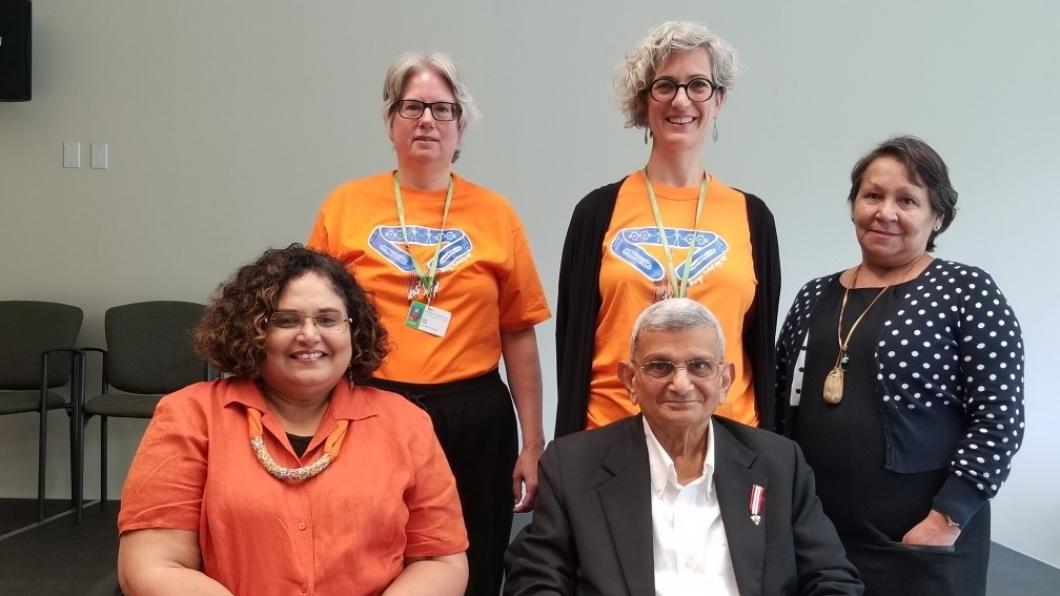
Day formally acknowledges impact and harmful legacy of residential schools
Photo taken during Holland Bloorview’s Orange Shirt Day 2019 event. From left to right: Meenu Sikand, executive lead, equity, diversity and inclusion, Holland Bloorview; Lise Olds, administrative assistant, Bloorview Research Institute; Chandrakant P. Shah, consultant physician, Anishnawbe Health Toronto; Julia Gray, postdoctoral fellow, Social Sciences and Humanities Research Council; Sandra LaFleur, Indigenous leader.
September 30, 2020 is Orange Shirt Day, and Holland Bloorview Kids Rehabilitation Hospital joins communities across Canada in recognizing the harmful legacy of the residential school system on Indigenous communities, and the ongoing resistance and resilience these communities continue to demonstrate. The focus of the hospital’s efforts this year is to share its journey in learning about Indigenous history and finding culturally safe ways to provide the best possible healthcare to Indigenous peoples. Indigenous cultural safety (ICS) training at Holland Bloorview is aimed at building staff knowledge around Indigenous history in Canada using Indigenous narratives.
By March 31, 2020, 28 staff successfully completed the training and another 30 have enrolled this year in the San’yas ICS training program. In February, a debriefing session was organized for all learners. Facilitated by Diane Smylie, Ontario Indigenous Cultural Safety program director, and Leila Monib, provincial lead trainer, it extended learning and touched on how better and more appropriate care and services can be provided to Indigenous communities.
Learners were followed up with six months later to ensure they had opportunities to apply their acquired knowledge and skills, to understand how the training has been implemented and to identify if any of their learnings have impacted their professional and personal lives. A reflection of staff experience with ICS is included below.
On Orange Shirt Day 2019, 60 Holland Bloorview staff participated in a blanket exercise, an interactive educational program that taught about the history of Canada’s Indigenous peoples. Additionally, a panel discussion took place that was hosted by Sandra Lafleur, Indigenous leader, and Chandrakant P. Shah, consultant physician with Anishnawbe Health Toronto. They reflected on ways staff can better engage with Indigenous children and families in delivering healthcare services with sensitivity while understanding the history of discrimination and violence experienced by Indigenous communities within the healthcare system.
Moving forward, Holland Bloorview is developing an official land acknowledgement statement adapted from a model created by the University of Toronto. Indigenous system partners and health delivery organizations will be consulted, and direction will be taken from Indigenous stakeholders when crafting the statement.
Please join us in participating in Orange Shirt Day by listening to the stories of residential school survivors and their families, honouring the healing journey and committing to the reconciliation process.
Reflections on Indigenous cultural safety training from Holland Bloorview staff:
What was your main takeaway or learning after taking this course?
Joanne Maxwell, senior director, collaborative practice: “I learned that there is so much about the history and treatment of Indigenous peoples that was never part of my education—not in public education, nor in professional/clinical/leadership education. This history is so important to understand when considering how we can empower and include Indigenous voices and ideas in service delivery. The absence of this learning contributes greatly to systemic racism and discrimination.”
Peter Rumney, physician director, inpatient: “I was dumfounded to learn that the Indian Act really is a formula for cultural genocide and enforced assimilation.”
Have you used what you’ve learnt in your current work or personally?
Julia Hanigsberg, president and CEO: “Learnings from the ICS course are informing the way I am thinking about our work in anti-racism and anti-oppression. Our IDEA Task Force work plan will give us an opportunity to put these learnings into action. We know that racism harms children. We know COVID-19 has had disproportionate impact on Indigenous people. We must act on this knowledge. Right now we are exploring which children we are not serving in order to challenge ourselves to solve missed opportunities for care due to unequal access to care and services.”
Would you recommend this ICS course to your colleagues and friends?
Rianne Hastie-Adams, research coordinator, Autism Research Centre: “I have recommended this course to my colleagues and to family and friends. If I had my choice, this training would be mandatory for everyone who works in healthcare, and would become part of continuous learning.”
Stewart Wong, vice president, communications, marketing and advocacy: “I highly recommend the ICS course to anyone in any role in the organization. It is both engaging, instructional and confronting in all the ways that can move us forward.”
Additional Orange Shirt Day events:
- Laurentian University: September 30, Roger Chum will be sharing his story as a residential school survivor, 10:30 a.m. to 12:30 p.m.
- SickKids: September 30, Dr. Suzanne Stewart’s webinar (“What is Indigenous Health and Reconciliation in Health Care and Why is it Relevant to You?”), 12 p.m.
- Ryerson University: September 30, webinar, 12:45 to 1:45 p.m.
- University of Victoria: September 30, Facebook Live event featuring the story that inspired the Orange Shirt Day movement, 3 p.m.
- Orangeville Public Library: September 30, Sarah Ritchie will share how the residential school system impacted her life, 7 to 8 p.m.
- SickKids: October 1, Dr. Ian Mosby’s webinar (“Truth, Reconciliation & the Legacy of Nutrition Experimentation in Residential Schools”), 12 p.m.
- Woodland Cultural Centre (Haudenosaunee): October 2, residential school tour video, survivor interviews and Q&A, 6:30 to 8:30 p.m. (paid event)
- University of Alberta: A free online course through the Faculty of Native Studies on Indigenous Canada